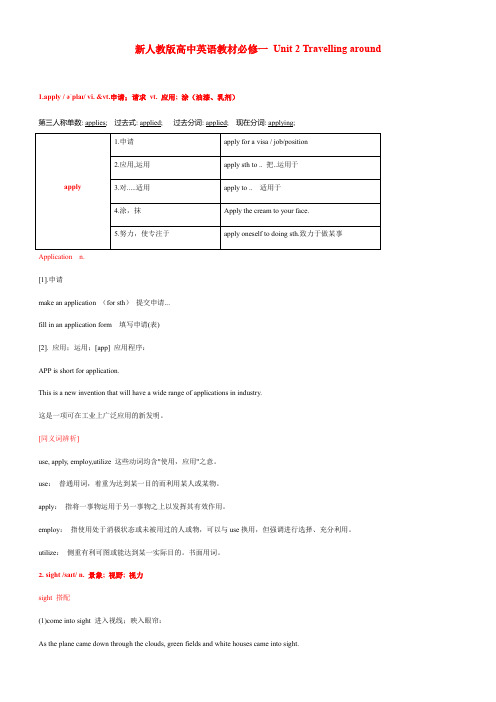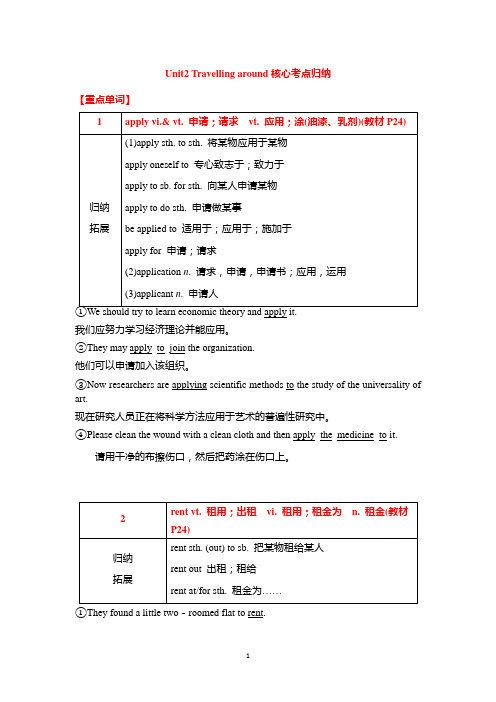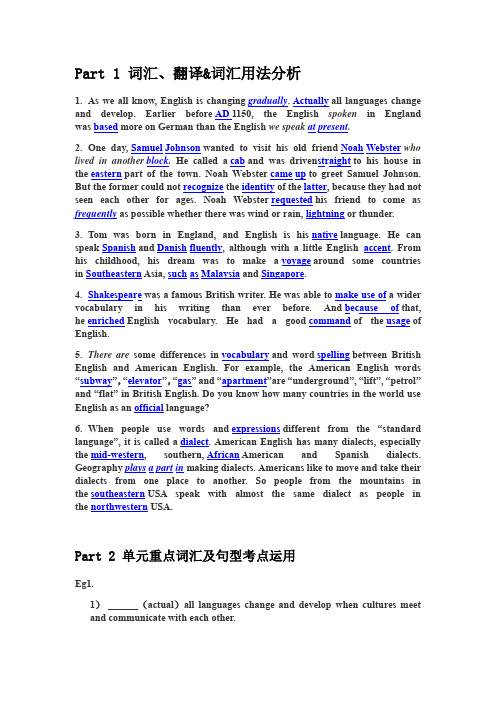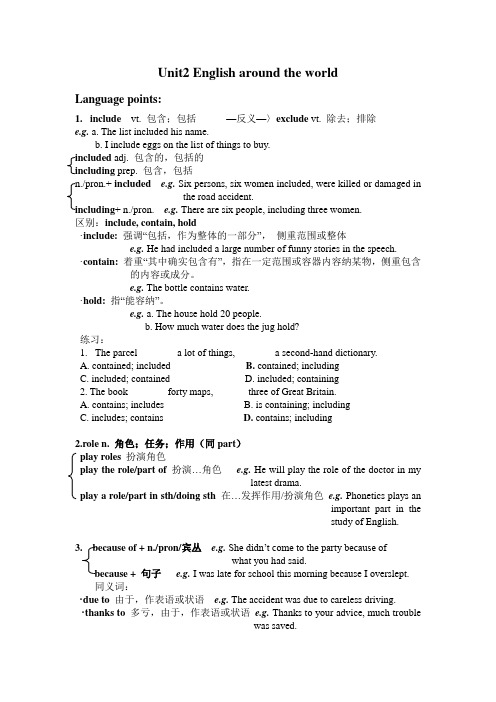人教版高中英语必修一Unit2语言知识点
新人教版(2019)高中英语必修一Unit 2 重点单词详解(超级详细)

新人教版高中英语教材必修一Unit 2 Travelling around 1.apply / əˈplaɪ/ vi. &vt.申请;请求vt. 应用; 涂(油漆、乳剂)Application n.[1].申请make an application (for sth)提交申请...fill in an application form 填写申请(表)[2]. 应用;运用;[app] 应用程序:APP is short for application.This is a new invention that will have a wide range of applications in industry.这是一项可在工业上广泛应用的新发明。
[同义词辨析]use, apply, employ,utilize 这些动词均含"使用,应用"之意。
use:普通用词,着重为达到某一目的而利用某人或某物。
apply:指将一事物运用于另一事物之上以发挥其有效作用。
employ:指使用处于消极状态或未被用过的人或物,可以与use换用,但强调进行选择、充分利用。
utilize:侧重有利可图或能达到某一实际目的。
书面用词。
2.sight /saɪt/ n. 景象; 视野; 视力sight 搭配(1)come into sight 进入视线;映入眼帘:As the plane came down through the clouds, green fields and white houses came into sight.(2)catch sight of 看见;发现:Suddenly, I caught sight of my English teacher in the crowd.(3)lose sight of 看不见;忽略;I lost sight of him in the crowd.(4)in sight 看得见,在视线内(5)out of sight 看不见(6)at first sight 一见(就);乍一看:fall in love with sb at first sightAt first sight, there is nothing special about the watch, but in fact it is a mobile phone.(7)at the sight of 一看见:Some people will faint at the sight of blood.(8)(谚语)眼不见,心不想out of sight, out of mind3.amaze v. 使惊奇/惊愕be amazed at/by/that.. 对....感到惊奇be amazed to doamazing / əˈmeɪzɪŋ / adj. 令人惊奇的;令人惊喜的amazing sightsamazed / əˈmeɪzd / adj. (人感到)惊奇的;惊喜的amazement n. to one's amazement 令某人惊讶的[同义词辨析]surprise, amaze, astonish, stun这些动词均含"使惊愕,使惊讶,使惊奇"之意。
人教版高二英语必修一unit2知识点

人教版高二英语必修一unit2知识点Unit 2: English in ActionIn this article, we will explore the key knowledge points of Unit 2 in the People's Education Press (PEP) textbook for Grade 11 English.1. Reading SkillsUnit 2 focuses on improving reading skills through various activities. It emphasizes the ability to read and comprehend different types of texts, including narratives, advertisements, and news articles. Students are encouraged to analyze the main ideas, supporting details, and author's purpose in these texts.2. Grammar and VocabularyThis unit introduces several important grammar points and vocabulary related to the topic of travel. Students learn about verb patterns, such as the use of infinitives and gerunds. They also study adverbs of frequency and time expressions to discuss past and future events. Additionally, this unit expands their travel-related vocabulary, such as words associated with transportation, accommodation, and tourist attractions.3. Listening and SpeakingUnit 2 aims to enhance students' listening and speaking skills by engaging them in various activities related to travel. Students practice listening to conversations, interviews, and speeches to improve their ability to understand spoken English. They also participate in role plays and presentations to communicate effectively and express their opinions on travel experiences.4. Writing SkillsIn this unit, students develop their writing skills by focusing on descriptive and narrative writing. They learn how to structure paragraphs, use appropriate transition words, and create vivid descriptions. Additionally, they practice writing informal letters and travel reviews to improve their ability to express their thoughts in writing.5. Culture and SocietyUnit 2 provides insights into different cultures and societies around the world. It explores diverse travel experiences, customs, and traditions of various countries. Students gain a better understanding of global perspectives and develop cross-cultural communication skills.6. Exam PreparationThroughout Unit 2, students are provided with exam preparation exercises and tips. These activities help them familiarize themselves with the format of English exams and improve their test-taking strategies. The unit also reinforces their knowledge of grammar, vocabulary, reading, and listening skills to ensure they are well-equipped for assessments.ConclusionUnit 2 of the PEP textbook for Grade 11 English covers a wide range of knowledge points to enhance students' English language proficiency. By focusing on reading, grammar, vocabulary, listening, speaking, writing, and cultural understanding, this unit aims to develop well-rounded language skills and prepare students for future academic and real-world experiences.。
人教版高中英语必修一Unit-2单元知识点

人教版高中英语必修一U n i t-2单元知识点(总10页)--本页仅作为文档封面,使用时请直接删除即可----内页可以根据需求调整合适字体及大小--必修一 Unit2 English around the world要点提炼 Section A重点词汇,短语,句式adj.官方的;正式的;公务的You will have to get official permission to cut down the trees.你得获得官方批准才可以砍伐这些树。
There will be an official inquiry into the matter.将对这件事进行正式调查。
【拓展】official 或 officer两者都有官员的意思,但是所指不同1,official常指政府官员或行政官员2,officer常指身特定制服的官员,如军官或者警官等。
练习:我爸爸是军官,而他爸爸是政府官员。
My father is an________ in the army, while his father is an________ in the government.答案:officer official3. native adj. 本国的;本土的 n.本地人,本国人The women are native people.这些妇女是本地人。
Finally, she returned to her native land.她最后返回了她的祖国。
The panda is a native of China.熊猫原产于中国。
【注意】native 做形容词用时,只能做前置定语。
be native to 意为(动植物)是…特有的,原产于…The tiger is native to India, 这种虎产于印度。
4. actually adv. 实际上;事实上(相当于in fact/as a matter of fact)He looked calm, but actually he was very nervous.他看起来很镇定,实际上却非常紧张。
高中英语新版人教必修一Unit 2 Travelling around知识点(单词短语语法句型)归纳

Unit2 Travelling around核心考点归纳【重点单词】We should try to learn economic theory and apply it.我们应努力学习经济理论并能应用。
②They may apply_to_join the organization.他们可以申请加入该组织。
③Now researchers are applying scientific methods to the study of the universality of art.现在研究人员正在将科学方法应用于艺术的普遍性研究中。
④Please clean the wound with a clean cloth and then apply_the_medicine_to it.请用干净的布擦伤口,然后把药涂在伤口上。
①They found a little two-roomed flat to rent.他们找到了一个出租的小两居室。
②The apartment rents_for $500 a month.这套房间每月租金为500美元。
③They actually moved down from upstairs because the rent was that expensive. 他们确实从楼上搬到了楼下,因为房租太贵了。
④We rented the villa to an American couple.我们将别墅出租给了一对美国夫妇。
I haven't packed my suitcase yet.我的行李箱还没收拾好呢。
②After dinner the customer packed_up the remains on the table.饭后,顾客把桌子上的剩饭打包了。
③He used to smoke a_pack_of cigarettes a day.过去他常常一天抽一包烟。
新人教版(2019)高中英语必修一Unit 2 重点单词详解(超级详细)

新人教版高中英语教材必修一Unit 2 Travelling around 1.apply / əˈplaɪ/ vi. &vt.申请;请求vt. 应用; 涂(油漆、乳剂)Application n.[1].申请make an application (for sth)提交申请...fill in an application form 填写申请(表)[2]. 应用;运用;[app] 应用程序:APP is short for application.This is a new invention that will have a wide range of applications in industry.这是一项可在工业上广泛应用的新发明。
[同义词辨析]use, apply, employ,utilize 这些动词均含"使用,应用"之意。
use:普通用词,着重为达到某一目的而利用某人或某物。
apply:指将一事物运用于另一事物之上以发挥其有效作用。
employ:指使用处于消极状态或未被用过的人或物,可以与use换用,但强调进行选择、充分利用。
utilize:侧重有利可图或能达到某一实际目的。
书面用词。
2.sight /saɪt/ n. 景象; 视野; 视力sight 搭配(1)come into sight 进入视线;映入眼帘:As the plane came down through the clouds, green fields and white houses came into sight.(2)catch sight of 看见;发现:Suddenly, I caught sight of my English teacher in the crowd.(3)lose sight of 看不见;忽略;I lost sight of him in the crowd.(4)in sight 看得见,在视线内(5)out of sight 看不见(6)at first sight 一见(就);乍一看:fall in love with sb at first sightAt first sight, there is nothing special about the watch, but in fact it is a mobile phone.(7)at the sight of 一看见:Some people will faint at the sight of blood.(8)(谚语)眼不见,心不想out of sight, out of mind3.amaze v. 使惊奇/惊愕be amazed at/by/that.. 对....感到惊奇be amazed to doamazing / əˈmeɪzɪŋ / adj. 令人惊奇的;令人惊喜的amazing sightsamazed / əˈmeɪzd / adj. (人感到)惊奇的;惊喜的amazement n. to one's amazement 令某人惊讶的[同义词辨析]surprise, amaze, astonish, stun这些动词均含"使惊愕,使惊讶,使惊奇"之意。
人教版高中英语必修一 unit 2 单元重点词汇及句型

Part 1 词汇、翻译&词汇用法分析Part 2 单元重点词汇及句型考点运用Eg1.1)(actual)all languages change and develop when cultures meet and communicate with each other.2)Growing vegetables looks easy, but (actual)it takes a lot of learning.Key: 1)actually 2)actuallyActually, adv.实际上,事实上,相当于in actual fact,as a matter of fact, infact,in reality等,actual为其形容词,做题注意分析句子中所需词性。
Exercise 1.There is a big difference between what they have said and what they have (actual)done.Exercise 2.He looks younger than his wife, but in (actually)fact, he is a lot older.Exercise 3. (actual),reading skills should be based on the knowledge of English writing.Eg2.1)It was (base) on German than the English we speak atpresent.2)They settled down at the base the mountain.3)Do you know where the air is?Key: 1) based 2) of 3)basebase v. 以...为根据base...on/upon,被动形式为be basedon/uponn. 基地,基础at the base ofExercise 1.We have all kinds of summer camp for your holidays. Youcan choose one (base)on your own interests.Exercise 2. (base)on a true story, the film attracts manypeople, whether they are old or young.Exercise 3. (base)an important decision more on emotion thanon reason, you will regret it sooner or later.Eg3.说出下面句子中present的意思分别为什么1)The present president present at the meeting presented us withpresents.present:adj:现在的&出席的 at present;到场的v.:颁发;把...交给... ; present sb. with sth. 呈现n.: 礼物 present sth. to sb.根据present的用法完成下列句子Exercise 1.I’m getting along well with my classmates .Exercise 2.The headmaster a medal each winner.Eg4.1)Every minute should be (make)of to study.Key: 1) madefull/good充分利用:make+ the best use ofthe mostExercise 1.You’d better (利用空闲时间)to gooutdoors.Exercise 2.Every possible use should be made advancedtechnologies.Eg5.1)He presented two solutions. The (后者) seemed muchbetter.2)The former question is more difficult for me than the one. Key: 1)latter 2)latterlatter n.(两者中的)后者(与the连用)adj.(两者中)后者的固定结构:the former...the latter... 前者...后者...Exercise 1.I have two friends, Mary and Lily. (前者)is good at dancing, (后者)can speak Danishfluently.Exercise 2.If I were forced to choose one of the two, I would prefer Latter.Eg6.1)The old man is concerned about many teenagers, (例如)John, Peter and Tom.2)Tom doesn’t like sports. (例如),he is never seen toplay on the playground.Key:1)such as 2)For examplesuch as 用于列举前面提到的事物的一部分for example 用于举例说明,可以置于句首、句中或句末Exercise 1.Young people are encouraged to take part in team sports Football and basketball.Exercise 2.What would you do if you met a wild animal, a tiger,?Eg7.1)I (frequent)join in class discussions and talk withmy partner about problems of teenagers.2)More and more Chinese people can speak (fluently)English.Key:1)frequently 2)frequentfrequently adv.经常,频繁地其adj.为frequentExercise 1.Tom has studied English in London for many years and nowshe can speak English (frequent).Exercise 2.He made (fluently)visit to his grandparents.Eg8.1)Computers play important part in modern society.2)The actress was invited to play role in this TV playbased on a true story.Key:1)an 2)aplay a part/role in 在...中起作用;在...中扮演角色Exercise 1.Petrol (在...中起重要作用)our daily life.Exercise 2.He played important part in the TV SERIES.Eg9.1)The moment I answered the phone, I (recognize)hisvoice.2)It is (recognize)that the environment pollution hasbecome more and more serious.Key:1)recognized 2)recognizedrecognize vt.辨别出;辨认出;承认;公认 be recognized as... 被认为是...It is recognized that...人们公认...recognition n. beyond/out of recognition(变得)完全认不出来Exercise 1.Twenty years has gone and my hometown has changed beyond (recognize).Exercise 2.Believe it or not, Lily came up to me yesterday, but Ididn’t (认出)her at first.Eg10.1)When people use words and (express)different fromthe “standard language”, it is called a dialect.2)Young children often have difficulty (express)themselves.Key: 1)expressions 2)expressingexpression n.词语;表达;表情facial expressionexpress v.表达;快递 have difficulty (in) doingexpressive adj.有表现力的Exercise 1.In order to lear n English well, you’d better use important (express) frequently in everydaylife.Exercise 2.You should give (express)to your feelings in your speech.Exercise 3.The ability (express)an idea is important asthe idea itself.Exercise 4.A worried (express) crossed her face.Eg11.1)The manager requested that all the dusty curtains(be)washed.2)The general gave a command that they (start) at once.Key: 1)(should) be 2)(should) startcommand作“命令”讲,request作“请求,要求”讲时,that从句要用虚拟语气,即动词用“(should)+动词原形”,should可以省略。
高中英语必修一unit2知识点复习归纳

Unit2 English around the worldLanguage points:1.include vt. 包含;包括—反义—〉exclude vt. 除去;排除e.g.a. The list included his name.b. I include eggs on the list of things to buy.adj. 包含的,包括的prep. 包含,包括included e.g. Six persons, six women included, were killed or damaged inthe road accident.+ n./pron. e.g. There are six people, including three women.区别:include, contain, hold·include:强调“包括,作为整体的一部分”,侧重范围或整体e.g.He had included a large number of funny stories in the speech. ·contain:着重“其中确实包含有”,指在一定范围或容器内容纳某物,侧重包含的内容或成分。
e.g. The bottle contains water.·hold:指“能容纳”。
e.g. a. The house hold 20 people.b. How much water does the jug hold?练习:1.The parcel _______ a lot of things, _______ a second-hand dictionary.A. contained; includedB. contained; includingC. included; containedD. included; containing2. The book _______ forty maps, ______ three of Great Britain.A. contains; includesB. is containing; includingC. includes; containsD. contains; including2.role n. 角色;任务;作用(同part)play roles扮演角色play the role/part of 扮演…角色 e.g. He will play the role of the doctor in mylatest drama.play a role/part in sth/doing sth在…发挥作用/扮演角色e.g.Phonetics plays animportant part in thestudy of English.3. because of + n./pron/宾丛 e.g.She didn’t come to the party because ofwhat you had said.because + 句子 e.g. I was late for school this morning because I overslept.同义词:·due to 由于,作表语或状语 e.g. The accident was due to careless driving. ·thanks to多亏,由于,作表语或状语e.g. Thanks to your advice, much troublewas saved.·owing to 由于,作表语或状语e.g. Tom’s failing in the exam was owing to hiscarelessness.·as a result of由于,作状语e.g.The flight was delayed as a result of fog.·on account of 因为,作状语e.g. We delayed our departure on account of the badweather.·by reason of 由于,因为,作状语e.g.He was excused by reason of his age.4. native adj.&n.①adj. a. 出生地的b. 本地的,土生土长的c. (常与to连用)本地产的A是B地特产的动物或植物:A be native to B. = A be a native of B.d.(指品质)与生俱来的,天生的②n. 本地人,本国人,某地的动物或植物e.g. a. Her native tongue is German.b. Tom is a native Englishman.c. Banana is native to Taiwan.== Banana is a native of Taiwan.d. native speakerf. He is a native of Beijing.g. Are you a native here, or just a visitor?h. The panda is a native of west China.注:One’s native place 指某人的出生地,但表达“是某地人”时,习惯上不说“My native place is …..”而说“I was born in ……”拓展:n.国家,民族national adj. 国家的,国民的n(c). 侨民n. (u) 国籍(c)民族 e.g. the minority nationalities 各少数民族5. the road to the modern Englishto 为介词,类似的有:the entrance to the hallthe answer(n.) to the question answer(v.) the questionthe key to the doora road to successa journey/trip to Beijing a visitor to Beijingthe guide to ….the notes to the textan introduction to English grammar6. not 与everything 连用表示部分否定类似的:all, both, every, whole, always, altogether, entirely, wholly 等与否定词连用,构成部分否定。
人教版高中英语必修一unit2语言点

人教版高中英语必修一unit2语言点高中英语学习材料(灿若寒星*制作整理)Unit2 English around the world编稿:陈玉莲审稿:目标认知重点词汇base, command, request, develop, identity, expect, recognize, straight actually,重点短语because of, come up, make use of, play a part in, the number of, even if, in the way, more than重点句型1 Believe it or not, no such thing...... do you think...?知识讲解because of【原句回放】... and because of that, English began to be spoken in many other countries.【点拨】because of 因为,复合介词,后接名词、代词或宾语从句,在句中作状语。
because 是连词,引导原因状语从句;而because of是复合介词,后跟名词、代词、动名词或名词性从句。
【拓展】because of的同义短语:thanks to多亏,由于,作表语或状语owing to 由于,作表语或状语as a result of… 因为……的结果,作状语due to由于,一般不用于句首,作表语或状语on account of 由于,作状语come up【原句回放】I’d like to come up to your apartment. 我很乐意到你的公寓去。
【点拨】come up (人)走近;(太阳、月亮)上来,上升;被提出,被讨论;(意想不到地)产生,开始;发芽,长出The question never came up. 从不曾发生过这个问题。
The sun came up. 太阳升起了。
